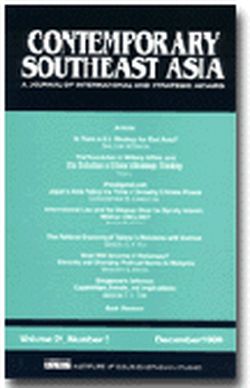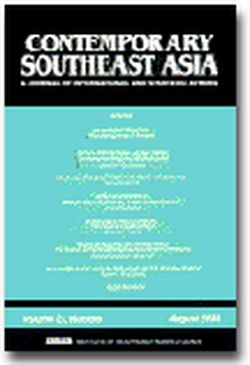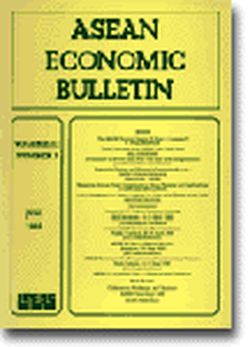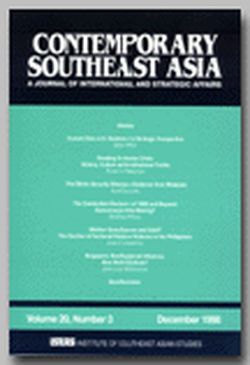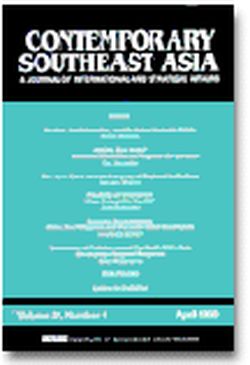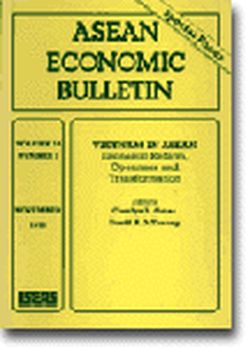Contemporary Southeast Asia: A Journal of International and Strategic Affairs Vol. 20/1 (Apr 1998)

Date of publication:
April 1998
Number of pages:
114
Code:
CS20/1
About the publication
An internationally refereed journal that specializes in the politics, international relations and security-related issues of Southeast Asia and the Asia-Pacific.
Contents
-
Preliminary pages
-
Australia's Regional Engagement, by Ramesh Thakur, contributor see abstractBy the 1990s, Australia stood at the crossroads of history and geography. Where in previous centuries Asia-Pacific propinquity was a curse to be avoided through exclusionary immigration, security and trade policies, today it is an opportunity to be exploited through co-operative enmeshment. Australiaâs fortunes are determined by broader political, economic and social forces at work around Asia and the world. Its involvement with the Asia-Pacific is inevitable, irreversible and probably even desirable. Yet the transition from a Eurocentric to an Asia-Pacific identity will be neither uncontroversial nor smooth. Australiaâs challenge for regional engagement is how to reconcile the preparedness, capability and credibility for dealing with Asia with the need to protect and nurture its own humanist, pluralist and democratic traditions.
-
ASEAN: Out of Its Depth?, by John Funston, contributor see abstractASEAN began 1997 under challenge from the United States and the European Union over its plans to admit Myanmar into the Association. It then faced successive crises relating to renewed civil war in Cambodia, the âhazeâ problem caused by massive forest fires in Indonesia, and the regional financial turmoil. ASEAN had some success in addressing the first two issues, which resembled problems faced in the past, though they have by no means been resolved. The haze, and especially the regional financial turmoil, represented new problems for ASEAN, and the organization was generally ineffective in addressing them. The approach to financial issues was, however, better conceived than ASEAN has been given credit for, and should prove beneficial over the long run.
-
Mechanism of Dispute Settlement: The ASEAN Experience see abstractThe greatest achievement of ASEAN for the past thirty years of its existence as a sub-regional body has been its ability to maintain peace and security in the region. It was this atmosphere of peace that allowed each member state to concentrate on domestic problems and put more effort into economic development. Achieving regional peace meant being able to manage intramural disputes among the states in the region. ASEANâÂÂs success in managing disputes has been underpinned largely by a complex, and sometimes perhaps misunderstood, process of confidence-building and conflict avoidance. This article looks at ASEANâÂÂs various mechanisms for dispute management, and determines the degree to which they have been successful.
-
Political Parties, Elite-Mass Gap and Political Instability in Hong Kong see abstractPolitical parties play a stabilizing role in any regime through articulation and aggregation of the interests of citizens. In the case of the Hong Kong Special Administrative Region (HKSAR), however, political parties that are popularly supported by citizens have minimal influence on the government. The HKSAR Government is increasingly dominated by clientelist parties and élites without strong grass-roots support. As the economic gap between the haves and have-nots becomes increasingly serious, and Hong Kong people are not satisfied with many livelihood issues such as housing, the unrepresentative and client-dominated polity will widen the gap between the government and ordinary citizens, with the potential danger of political instability.
-
Towards a Declaration on "Navigational Rights" in the Sea-lanes of the Asia-Pacific, by Ramses Amer, contributor see abstractThis article examines the possible contribution of a declaration on ânavigational rightsâ in the sea-lanes of the Asia-Pacific as a confidence-building measure. It defines ânavigational rightsâ with the help of the 1982 United Nations Convention on the Law of the Sea (UNCLOS). The degree of acceptance of the provisions of UNCLOS is outlined with a focus on the countries of the Asia-Pacific. The advantages and problems associated with a possible declaration on ânavigational rightsâ as a confidence-building measure are discussed and assessed. It is argued that countries in the region can agree upon navigational rights without prejudicing their territorial claims, using UNCLOS as the key guiding principle.
- BOOK REVIEWS
-
BOOK REVIEW: War in the Blood: Sex, Politics and AIDS in Southeast Asia, by Chris Beyrer, by Marc Askew, contributor
-
BOOK REVIEW: Grey-Area Phenomena in Southeast Asia: Piracy, Drug Trafficking and Political Reform, by Peter Chalk, by Carl Grundy-Warr, contributor

